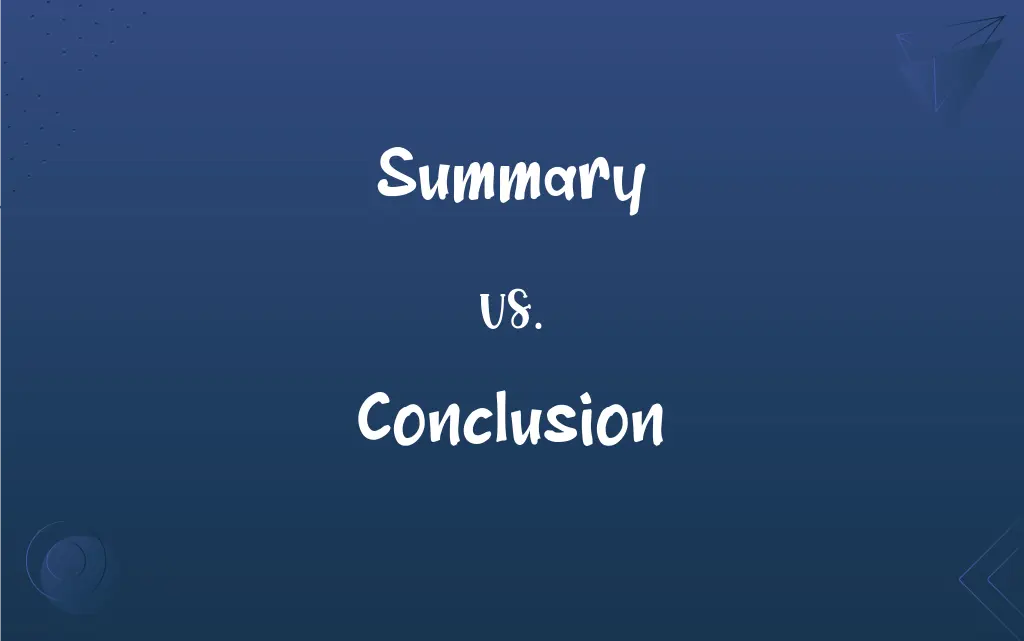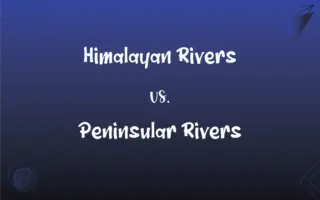Summary vs. Conclusion: What's the Difference?
Edited by Janet White || By Harlon Moss || Updated on October 10, 2023
A summary is a brief account of main points, while a conclusion provides final thoughts and implications derived from presented information.

Key Differences
A summary involves concisely restating the main points or essential details of a text or occurrence. It aims to provide a quick snapshot, allowing individuals to grasp the core ideas without engaging with the entirety of the content. On the other hand, a conclusion usually serves to bring closure and underline the significance or implications of the information presented, often within a report, essay, or research paper.
The primary objective of a summary is to encapsulate the primary details, actions, or findings, presenting them in a minimized form. Often, it doesn’t give closure but rather provides an overview or snapshot of the content. Conversely, conclusion seeks to wrap up discussions or findings, and may present recommendations, final thoughts, or calls to action, providing a closing to a discussion or analysis, hence drawing a line under the main work.
While a summary refrains from including additional commentary or insight, opting instead to stick closely to the original material or findings, a conclusion does often involve the incorporation of additional insights, reflections, or perspectives. A conclusion ties together the preceding elements, offering a final commentary on their collective meaning, potential implications, or future applications.
A summary might appear at the beginning of a text to provide preliminary insights (as in an abstract) or throughout to offer a reduced description of various details. In contrast, a conclusion is typically positioned at the end of a text or discourse. This positioning underlines its role in providing a concluding reflection on the prior information or discussions, offering final insights or implications based on the preceded content.
Comparison Chart
Purpose
To condense and represent main points briefly.
To offer final thoughts and wrap up the document/discussion.
ADVERTISEMENT
Position in Text
Can be at the beginning (like an abstract) or throughout.
Typically found at the end of a document or discussion.
Inclusion of Insight
Usually sticks to representing existing information.
Often includes new insights, reflections, or recommendations.
Length
Typically brief, providing a quick overview.
Can be longer, providing a detailed final commentary.
Intent
To inform quickly without needing to engage deeply.
To provide closure, implications, or next steps.
Summary and Conclusion Definitions
Summary
A summary is a brief statement or account of the main points of something.
The manager provided a summary of the meeting to those who could not attend.
ADVERTISEMENT
Conclusion
A conclusion is the final part which sums up the preceding arguments or information.
The conclusion of his speech provided solutions to the issues he had discussed.
Summary
A summary abstracts and reduces the primary content to its most crucial points.
The summary at the beginning of the chapter helped her understand the key concepts.
Conclusion
A conclusion may present implications, recommendations, or suggest further research or actions.
The conclusion of the study recommended implementing the strategy across all departments.
Summary
In texts, a summary might serve as an abstract, providing preliminary insights or overview.
The research paper began with a summary highlighting the main findings and methodology.
Conclusion
In essays or reports, the conclusion serves to provide closure, synthesizing the information or arguments.
Her essay had a strong conclusion that summarized her main points and reiterated her stance.
Summary
It's often a neutral presentation without providing additional insights or commentary.
The report provided a summary of statistical data without interpreting the findings.
Conclusion
It often encapsulates the results, findings, or final thoughts on a particular subject matter.
The scientific report provided evidence that supported the hypothesis stated in the conclusion.
Summary
It serves to present the essential aspects or contents in a condensed form.
Students were asked to write a summary of the article they had read.
Conclusion
In debates or logical arguments, a conclusion is derived from premises through reasoning.
The detective drew a conclusion about the suspect’s motives after examining all the evidence.
Summary
A brief statement mentioning the main points of something
A summary of our findings.
Conclusion
The close or last part; the end or finish
The conclusion of the festivities.
Summary
Prose that provides information in a condensed format, as by mentioning only the most significant details of a narrative
The novelist did not like writing dialogue and preferred to write stories in summary.
FAQs
What is the main purpose of a conclusion?
A conclusion provides closure and may offer final thoughts, implications, or recommendations.
Does a conclusion always offer recommendations?
No, while conclusions often include recommendations, they can also simply summarize or provide final thoughts.
Can a summary be written in different tenses?
While summaries are often in the present tense, the tense might vary depending on the original text and context.
Is it necessary to include every point in a summary?
No, a summary should include only the most crucial points or themes.
Can a conclusion have subsections?
While it's uncommon, a lengthy and complex document might have a conclusion with subsections.
Should a summary have a title?
Yes, often summaries have a title to guide the reader regarding the content.
What is a summary?
A summary is a condensed version of a larger text that highlights its key points.
Is a summary detailed?
A summary is not very detailed; it provides an overview of the main points in a concise manner.
Should a summary be unbiased?
Yes, a summary should objectively represent the main points without introducing bias.
Can a conclusion be open-ended?
Yes, some conclusions can be intentionally open-ended to provoke thought or continued dialogue.
Where is a conclusion usually located?
A conclusion is typically found at the end of a text, document, or discussion.
Can a conclusion introduce new information?
Generally, a conclusion should not introduce new major points but can present new insights or implications.
How long should a summary be?
The length of a summary can vary but it should be significantly shorter than the original text and to the point.
Is the conclusion the same as the summary?
No, while both summarize content, a conclusion also provides closure and may present final insights or implications.
What is an executive summary?
An executive summary provides a brief but comprehensive synopsis of a business report or proposal.
How should a summary begin?
A summary typically begins by stating the main idea or purpose of the original text.
Can a conclusion be impartial?
Yes, a conclusion can be impartial, though it often reflects the findings or main points discussed.
Can a summary include opinions?
No, a summary typically represents content without providing additional commentary or opinion.
Can a conclusion be a call to action?
Yes, conclusions can serve as a call to action, prompting readers to engage in a specific way.
Should a conclusion address the main objectives?
Yes, a conclusion should address the main objectives and provide a coherent end to the discussion.
About Author
Written by
Harlon MossHarlon is a seasoned quality moderator and accomplished content writer for Difference Wiki. An alumnus of the prestigious University of California, he earned his degree in Computer Science. Leveraging his academic background, Harlon brings a meticulous and informed perspective to his work, ensuring content accuracy and excellence.
Edited by
Janet WhiteJanet White has been an esteemed writer and blogger for Difference Wiki. Holding a Master's degree in Science and Medical Journalism from the prestigious Boston University, she has consistently demonstrated her expertise and passion for her field. When she's not immersed in her work, Janet relishes her time exercising, delving into a good book, and cherishing moments with friends and family.
































































